Does anyone read your website? 10 Tips for web copy that attracts clients and drives sales.3/29/2019 Just about every Realtor, mortgage lender, and business owner has a website these days, but does anyone actually read it? Too often, potential home buyers, sellers, borrowers or clients will log into your website only to take one look at the home page with its mismatch of endless paragraphs of text, and click right out. In fact, studies show that the average website visitor spends about 30 seconds on a site, and 55% of visitors spend less than 15 seconds! When that happens, it’s like having a big hole in your marketing funnel, with potential leads (and money) leaking right out. With website copy, every word, title, header, bullet point, and sentence is critical since you don’t have much time to make a good first impression. A good site with well-written copy will really grab your visitor, helping to pre-sell them and directly leading to more closed sales. Professionally written websites boost your search engine ranking, acts as the hub of your social media wheel, and establishes you as a credible expert in your field. You probably think that your website copy is “fine” or “OK,” but you probably wouldn’t read it, either if you were a new visitor. Objectivity is difficult when it’s your own site. And it’s not that most business people can’t write well; it’s just that they don’t know how to write website copywell – a totally different art in which less is way more. AIDA rules for web copy: When writing copy for your website, it’s best to keep the AIDA strategy in mind, an acronym that stands for: A – Attract Attention I – Trigger Interest D – Create a strong Desire A – Call to Action Let’s take a look at 10 methods to write clear, engaging, and persuasive web copy that homebuyers and sellers will actually read: 1. Use concise text Check out the websites for the biggest brands in the world and you’ll notice that they are big on simple, intuitive, and visual content that leads to the next step – not endless words. But if visitors to your website see a vast amount of text in paragraph form, they’ll automatically tune out. Use short words, short sentences, and even shorter paragraphs. As a good rule of thumb, write your web copy and then cut the word count in half, and then in half again. 2. Make sure your site is easy to scan When it comes to websites (and social media or just about anything online), people want to scan – not read. Research proves that only 16% of web visitors read text word for word and 79% just scan. So, break up text with headers, subheaders, numbered lists, bullet points, and even different fonts to make the information easily digestible in chunks. Oh, and don’t forget plenty of photos of beautiful houses and happy past clients! 3. The secret behind writing amazing web headlines Headers and subheaders are so important for effective web copy. Since most people just scan your website, creating compelling headlines or headers is crucial. Studies show that headlines with numbers (“10 Ways to buy a house in a good neighborhood”), those that promise to solve a problem or provide a benefit, play on words or common phrases, or use the tactic of negative knowledge (“5 Ways not to make costly home selling mistakes”) perform best. Contact me if you want more help with this! 4. Eliminate fluff Use clear, no-frills language. Avoid the temptation to fill your copy with adverbs and adjectives. Always write in the active voice and have a professional editor go through your copy. 5. Be clear about what you’re offering When someone goes to your web page, they should know in within seconds – the time it takes them to scan – what exactly you can do for them, but also your unique value or specialty as a Realtor. Highlight if you specialize in working with buyers, sellers, high-end homes, first-timers, in certain neighborhoods, or have awards, publishing credits, or other designations that will benefit them. 6. Ask your potential clients what they want! Any good website should include opportunities for visitors to offer their needs, desires, and feedback. You can do this with surveys, questions, and pop-ups that give them some sort of incentive to share their opinion. People love to be asked their opinion, especially when it comes to homes and real estate! 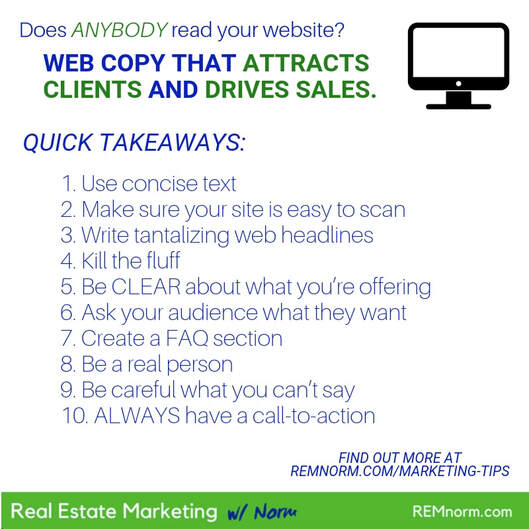 7. Create a Frequently Asked Questions (FAQ) section Instead of going on and on about every detail of your job and what you can do for them in paragraph form, create a detailed FAQ section, categorized by potential client’s questions and clickable, so it’s easy to navigate. 8. Be a real person People want to engage with a real person, not a robot or a faceless corporation. Tell your story, show your passion, and feel free to write in a familiar voice – just as long as you stay clear, concise, and always appropriate. Especially in the real estate field, it’s encouraged to have fun and show your personality, while also maintaining professionalism. 9. Be careful about what you can’t say Your clients look to you for invaluable information, but there are very tight rules (see: Fair Housing Act) that govern what Realtors can and can’t disclose. Likewise, mortgage lenders will end up in trouble if they advertise “Lowest rates around!” on their website. For Realtor web copy, even mentioning specific topics or answering certain questions could result in fines, loss of license – or even trigger litigation. So, don’t offer specifics about relative wealth socio-economic class of a neighborhood or area, school ratings, crime statistics, religious or ethnic demographics, etc. or you could get in hot water. 10. ALWAYS have a call-to-action Your website’s text should always conclude with a clear call-to-action, which simply leads them to the next step. It could be entering their email to get a free report, signing up for your blog or email newsletter, registering for a market analysis of their home price, or any other giveaway that provides help and value. *** With these tips in mind, take the time to pull up your website and look at it objectively. You probably don’t need to rewrite all of your site’s copy, but by implementing these best practices, you’ll soon notice an uptick in the number of visitors that stay on your site longer and contact you – and therefore, your number of clients! Contact me if you’d like a free look at your current website to see where it needs improvement – I’m happy to help!
0 Comments
There’s little doubt that you’re using Facebook as a platform to tell people about your business and attract new clients. But, if you’re like most Realtors, mortgage lenders, and even small business owners, you’re probably using your personal Facebook profile to do so, at least to some extent.
Uh oh. Sure, you created a Facebook business page a long time ago (about half of all real estate professionals and business owners do), but I’m guessing it’s now an afterthought. Instead, you prefer to interact, post content, and share your day-to-day business on your personal page. That’s a mistake. You’re wasting invaluable opportunities to market, promote, and grow your business. In a field where even one or two more home sales, closed loans, or new clients makes a huge financial difference, it’s critical that you not only set up a Facebook business page but utilize it correctly. I know what you’re thinking – but the people I know interact with me more on my personal page, and I don’t want to abandon that and start over with a business page. I have a quick and nearly-effortless solution that’s a win-win, so scroll down to the end if you want to see it. So, what are the benefits to a Facebook business page instead of just your personal profile? I’ll cover 10 important reasons why they are better than personal pages here and 10 more reasons in part two of this blog. 1. No limit to the number of fans Facebook personal profiles are capped at 5,000 friends, which you can reach pretty quickly if you have a growing business or practice. But with pages, there is no limit on the number of fans and followers you can engage and interact with. (Samsung is the top brand with 159 million likes, followed by soccer star Cristiano Ronaldowith 122 million likes.) While you may never reach Samsung/Ronaldo status on Facebook, don’t sell your business short by capping its potential growth at just 5,000 people. 2. Reach a Targeted Audience This is so important. If you’re a real estate agent, growing a social media following with people who live 100 miles away won’t do you any good. But you do want to market hard to your city, the 10-mile radius around your office, or even a certain neighborhood. And if you’re a mortgage lender, most of your business may come locally, but you can close loans throughout your home state. Likewise, local business owners need to carefully zoom in or out on a geographic target market to optimize business. Facebook business pages allow you to do just that, pinpointing your social media presence on the map. (I’ll talk more about targeting with ads and boosted content in part two of this blog.) 3. Facebook Insights With a Facebook page, you don’t need Google Analytics, as Facebook Insights will do the job for you. With Insights, you can access a mountain of data about your viewers, audience, reach, etc., using it all to improve your reach. You can even download a custom Insight report for more detailed stats and data, but this is only available on pages – not personal profiles. 4. Facebook Tabs You may notice on sophisticated and well-built Facebook pages that there’s a tabbed area under the cover photo, like a horizontal menu on a website. You can customize those tabs (sometimes with the help of third-party apps) to do just about anything, from Search Now and other call-to-action buttons to newsletter and blog opt-in forms, giveaways (we’ll talk about that next), video introduction, featured listings, and much more. Sorry – can’t do that with your personal profile. 5. Run contests, raffles, and giveaways Facebook is pretty specific with their rules regarding contests and giveaways on personal profiles – you’re not allowed to do it. But Facebook pages are the perfect place to run these special offers and fun contests, energizing your audience, creating a buzz, and feeding your marketing funnel (gathering emails, etc.). If you’re not doing some of these on a regular basis, you’re missing out on a HUGE opportunity (just make sure to check DRE for any regulations). 6. Reviews and testimonials Garnering 5-star reviews and glowing testimonials are so important in the real estate, mortgage, or small business game, where establishing social proof and building trust are paramount. You can do exactly that with a Facebook business page, but the only one leaving you a testimonial on your personal page is your disgruntled ex. 7. Connect to Facebook Places When your Facebook business page is optimized correctly, that page will connect automatically to the appropriate Facebook Place. Not only will that display all of your professional contact info, but it allows your clients and friends to check in. Check-ins are huge for growing your business because they show their friends that they’ve using your services, even in a mobile business like real estate, as well as sharing photos, videos, comments, and reviews of your services. That’s a very valuable promotional opportunity – and free with Facebook Places. 8. Contact info and other nuts and bolts I can’t tell you how many times consumers find a business website, page, or other social media account but can’t locate the most basic of info, like their phone number, email, address, website, and hours of operation. There is no good place to highlight these things on a personal profile, but with a business page, all of that will come across loud and clear – helping eager home buyers or sellers find you! 9. Enhanced privacy Business pages offer many more ways to monitor, screen, and filter the content that others are sharing on your timeline and page. Likewise, since your business page deals with your vocation and not your personal life, you’re creating a safety buffer to protect your identity, data, and even your family. I can’t stress that need enough as these days, being cautious and safe is so important for all Realtors, but especially female agents and business owners who might be working alone. 10. You can convert your personal profile to a business page Have you invested years of time and work into your profile, building it up to a few thousand friends? If that’s the case, then you definitely don’t want to lose that social media account, but the good news is that you can convert your personal page to a business page seamlessly, keeping your existing friends but opening up to all of the benefits of a business page. (However, you will lose your past content, so download all of your Facebook photos in a zip file first.) *** Here’s the easy solution I promised you: Don’t want to split your attention between your personal profile and a business page? Post content to your business page first, and then share it to your personal timeline. It will still reach your personal audience but also help make them aware of your business page and promote it, garnering likes, comments, and more interaction. Boom! Look for part two of this blog soon with 10 more reasons you NEED to use your business Facebook page. -Norm :-)  Interviewing someone is a fantastic marketing tool for any Realtor, loan officer, or professional. Recently, I had an epiphany while running on the treadmill. (No, it wasn’t that my shorts are too short or that I run too slow.) Instead, it was this: my humble Real Estate Marketing with Norm brand may not be anything special yet (although growing steadily), but I do have access to some incredible and inspiring professionals that people would love to hear about. So, why not tap into their wisdom, experience, and expertise by setting up a series of interviews? That’s exactly what I’ve undertaken, as once I was off the treadmill, I furiously sent out emails to some of the most accomplished and coolest real estate pros I know (as well as buying some longer shorts). Today, I’m super excited to share the marketing benefits of interviews, as well as the nuts and bolts of why they’re so powerful. The problem with most marketing Marketing tends to get “I-centric” for lack of a better term. “I can help you buy or sell your home,” “I’m the best professional to do the job,” and “I’m the greatest of all time.” Go to MY website, call ME, and I can get you a great mortgage loan – it’s all about me, myself, and I. Sometimes, if Realtors, loan officers, and business owners really “get it,” they elevate their marketing to focus on the client, instead – highlighting the benefits, stories, and help and value they received. That’s a huge shift from “I-centric” to focusing on your audience’s needs, challenges, and wants that will make all the difference. But there’s a next-level resource for your marketing that’s incredibly simple but also surprisingly powerful and effective: the interview. No matter if you’re a real estate agent trying to focus on a certain neighborhood, a lender narrowing in on a specific demographic, or any business owner targeting their marketing, an interview will serve you incredibly well. The marketing benefits of an interview An interview will also be a promotional coup for you, offering:
2X your audience – and increase your business Let’s talk about that last one for a moment. One of the chief benefits of creating these is cross-marketing to an exponentially larger audience. For instance, if you write up a nice piece about your favorite mortgage broker, they will probably super appreciate the effort and share or repost it with their social media followers and audience. With that, you’re given a warm introduction that includes your name, profession, social media links, email, blog or website, and a boat load of built-in trust and credibility. You may gain exposure among hundreds or even thousands of new people who didn’t know about you before, and benefit from potential new business accordingly. In fact, I’ve seen one simple interview 2X the size of someone’s audience! Think of the potential if you do a whole monthly series! Who should you interview? That’s the fun part, as the possibilities are limitless. Of course, you can interview someone who works with your clients, like a lender for Realtors or vice versa. Or, show some love to a referral partner by highlighting their business. Here are some examples:
You get the idea! Not only will most people agree to an interview, they’ll feel appreciated and honored and answer your emails or calls immediately! Conducting the actual interview To carry out an interview, it couldn’t be easier – just ask someone if you could spend 15 minutes asking them a few questions. Shoot them a list of perspective questions or topics ahead of time so they can think about it. Sit face to face or call them on Skype, Facetime, or just over the phone if you’re not in the same area. You can either video the interview or just record the audio using one of the many programs available on your laptop or even your smart phone. Where to post the interview Either way, you’ll edit it down and can use it in several places:
Give it an interesting name You can call it an interview, or some other catchy title like: 10 Fast Facts with _________. 10 Quotes by __________. 5 Questions with ___________. 10 Minutes with __________. Inside the mind of ________. Confessions of a _________. Etc. Aim high with the subject of your interview But it’s also a good idea to aim above your pay-grade on this one, so to speak. What I mean by that is don’t limit yourself to your best friend or someone who is already giving you business. Send out a few emails and requests to interview people who are notable, iconic, and even famous in your local city, region, or nationally. Why the heck not? You have nothing to lose. Think big. Profiling someone famous In a slightly different strategy, you can also write up a profile on someone famous instead of interviewing them, like I did here with real estate couch Mike ferry. It’s not an interview and I never talked to the man, but I put together a profile with a quick Google search that he’d find favorable. Remember we talked about cross-marketing to an exponentially larger audience? When profiling someone famous, enjoys name recognition, or anyone who holds a certain amount of gravitas, you really can tap into their massive number of fans and followers just by using the right hashtags or tagging them. A final word on interviews With interviews, you’re simply offering useful, interesting, and fun content to your audience and turning the spotlight from yourself to others. Pretty soon, someone will want to interview you!  *** Need help setting up an interview for your business? Or, do you have some great insights you’d like to share in one of my real estate marketing interviews? Hit me up! -Norm :-) Download and share your high-quality PDF version:
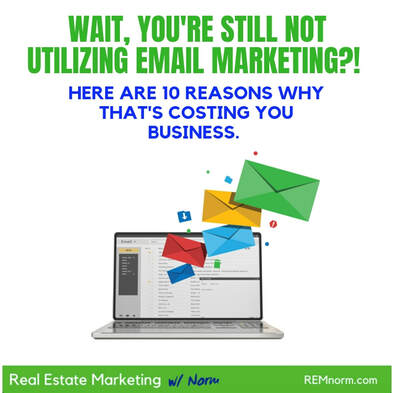 Back in 2006, the options for online marketing for real estate agents, mortgage lenders, and just about any business owner were a lot more limited. Sure, there was Facebook, but few people were using it for business, Twitter was brand new, AOL Instant Messenger was fun but not really useful for marketing, and Myspace was booming. Myspace! But every time you went to a broker training or any marketing Lunch-and-Learn, you were told that you should start building your email marketing campaign, including organizing and adding to your email database, creating great content, and sending it out consistently. Thirteen years later, and so much has changed with social media and online marketing (R.I.P. Myspace!). However, email marketing is STILL the tried and true method for reaching your audience directly where they live, work, and correspond. And you probably STILL haven’t implemented a regular email marketing campaign. Why the heck not? (Or, maybe you’re paying a company to send out generic “canned” content like gardening ideas, holiday notices, and maintenance tips that they send out for everyone else! BORING! – and ineffective.) Another (painful) way to think about it is this: imagine how big your email list would be now, how many extra deals you would have closed, and how much additional income you would have earned if you had started your email marketing campaign years ago? Ouch. You’re STILL missing a HUGE opportunity to generate leads. So, let's hammer this home again: Email marketing – such as newsletters, market reports, special offers, educational pieces, local profiles, invites, surveys, and even videos – offers some unique and highly effective benefits, serving as a perfect complement to social media and other marketing venues. We’ll cover some email marketing nuts and bolts and best practices in a future blog, but to open your eyes to how critical it is for any Realtor, loan officer, or any business, consider these 10 facts and stats (all based on credible research and studies): 1. Email marketing In fact, email marketing reportedly offers an average 3800% Return on Investment (ROI), which means it should bring in $38 for every $1 spent. In real estate, when a closed deal typically means thousands of dollars, that ROI is probably much higher. 2. Email is 40x more efficient at acquiring new clients than Facebook or Twitter. And a client on your email list is 6x more valuable over their lifetime than social media followers alone! 3. A message is 5x more likely to be seen when emailed compared to just posted on Facebook, or receive 6x more click-throughs than Tweets. 4. People who subscribe to your email list are 3x more likely to share your content on their social media accounts than people who come about your marketing messages other ways. 5. 72% of people prefer to receive promotional content by email compared to only 17% who want to see promotional messages on social media. (Although Instagram and Pinterest are higher than 17%. 6. Even better, 77% of consumers actually want to receive emails from brands and professionals they like and believe in – that’s you! 7. Email messages can be personalized to the receiver, and personal subject lines are 26% more likely to be opened. Additionally, personalized email messages see 14% higher click-through rates and 10% higher conversion rates. 8. All of the email marketing platforms allow you to track results like your Open Rate, Clicks, etc. and even see who signed up to your list or unsubscribed. You can also sync your email marketing campaign with your website, Facebook page, or simple landing or splash page that builds your list by giving away something for free. 9. Email marketing is still one of the best methods to deliver a singular message and drive traffic with a direct Call-to-Action. You can promote a new listing, announce an Open House, offer a CMA, talk about a special 0%-down loan program, talk about first-time homeownership, or just about anything else. Your email is just the "teaser," and with one click, the recipient is on your blog, website, watching your video, reading your report, or emailing you. 10. Email marketing is so powerful because of its exponential nature, picking up steam, scale, and results the more you do it. For instance, it takes about the same amount of money and time to send out a fantastic email to 10,000 as it does to 1,000 or just 100! So, are you finally going to start your email campaign, or are we going to be talking about this again in 2025? Probably not, if statistics hold, as only 17% of Realtors, lenders, and small businesses are utilizing email marketing campaigns. Maybe you think it’s too expensive (it’s definitely not), hard to set up (we can have your campaign for the whole year mapped out in a single weekend), or, most likely, you don’t have the time or energy to create content and actually DO IT all (that’s what I’m here for). Let’s solve that and get you on track to generate new leads, clients, and closed deals with great email marketing campaign – just email me to get started! -Norm :-) I don’t sell real estate or loans – I just make you guys a whole lot of money! |
Categories
All
Archives
December 2020
|
||||||
Get in touch: |


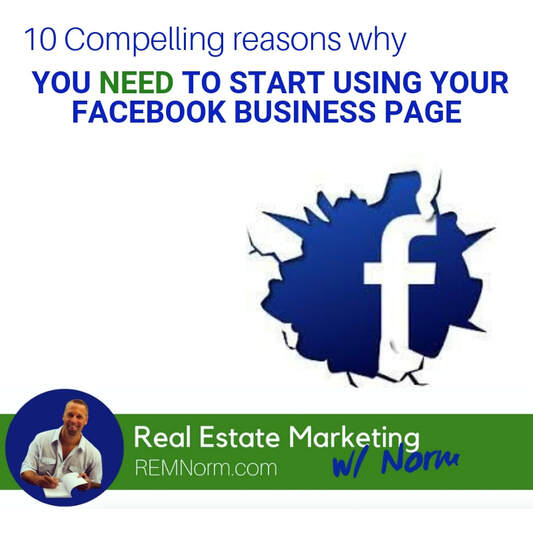
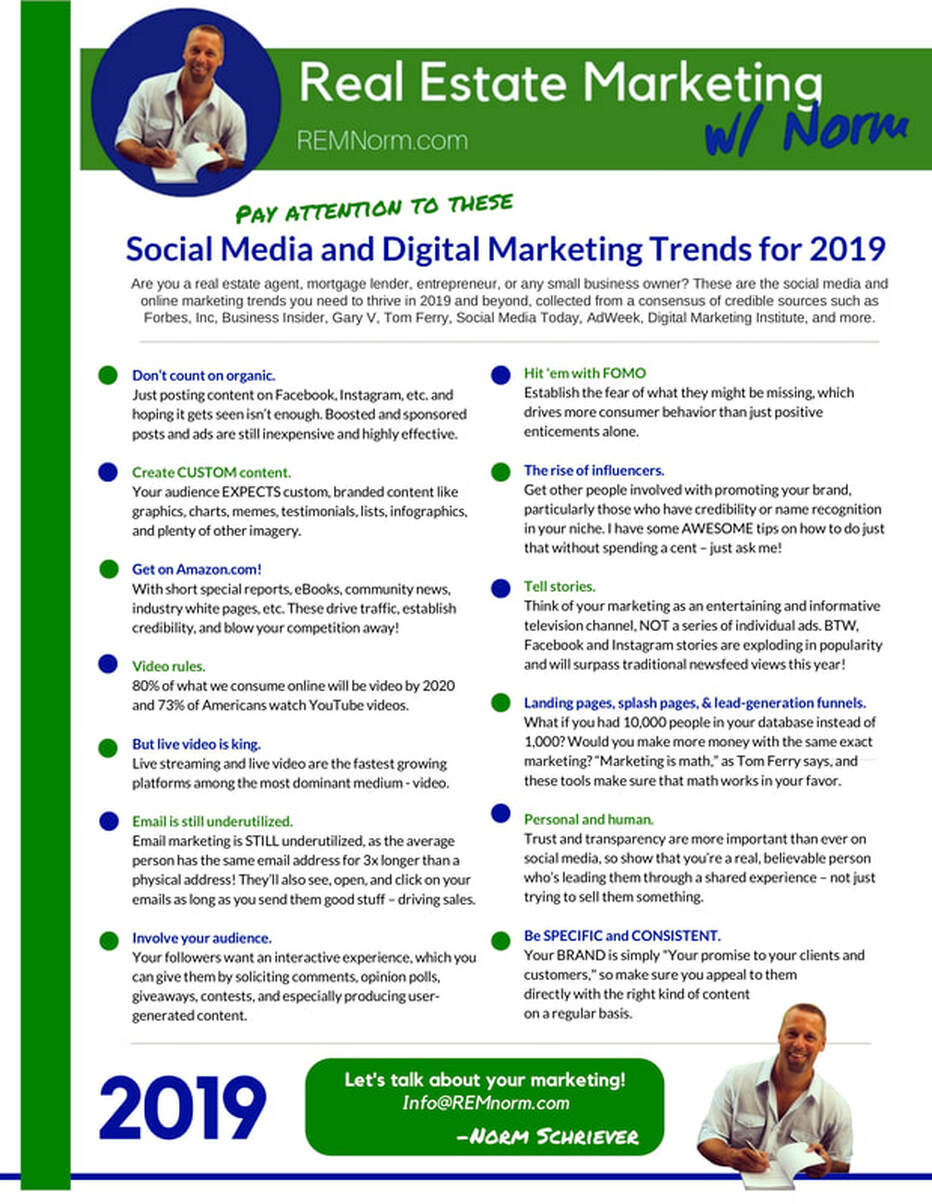
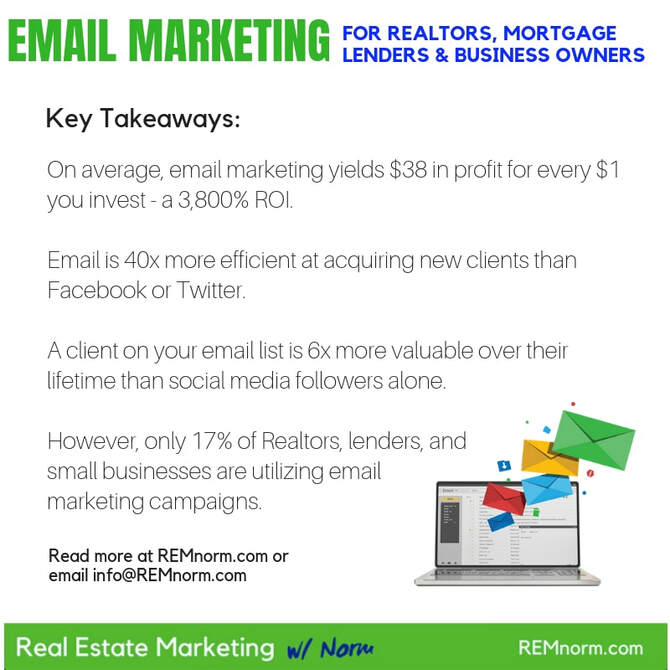
 RSS Feed
RSS Feed
